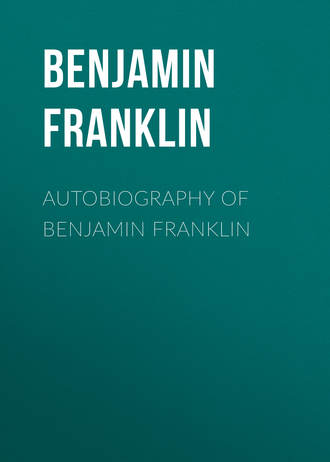 полная версия
полная версияAutobiography of Benjamin Franklin
About the end of April, 1724, a little vessel offer'd for Boston. I took leave of Keimer as going to see my friends. The governor gave me an ample letter, saying many flattering things of me to my father, and strongly recommending the project of my setting up at Philadelphia as a thing that must make my fortune. We struck on a shoal in going down the bay, and sprung a leak; we had a blustering time at sea, and were oblig'd to pump almost continually, at which I took my turn. We arriv'd safe, however, at Boston in about a fortnight. I had been absent seven months, and my friends had heard nothing of me; for my br. Holmes was not yet return'd, and had not written about me. My unexpected appearance surpris'd the family; all were, however, very glad to see me, and made me welcome, except my brother. I went to see him at his printing-house. I was better dress'd than ever while in his service, having a genteel new suit from head to foot, a watch, and my pockets lin'd with near five pounds sterling in silver. He receiv'd me not very frankly, look'd me all over, and turn'd to his work again.
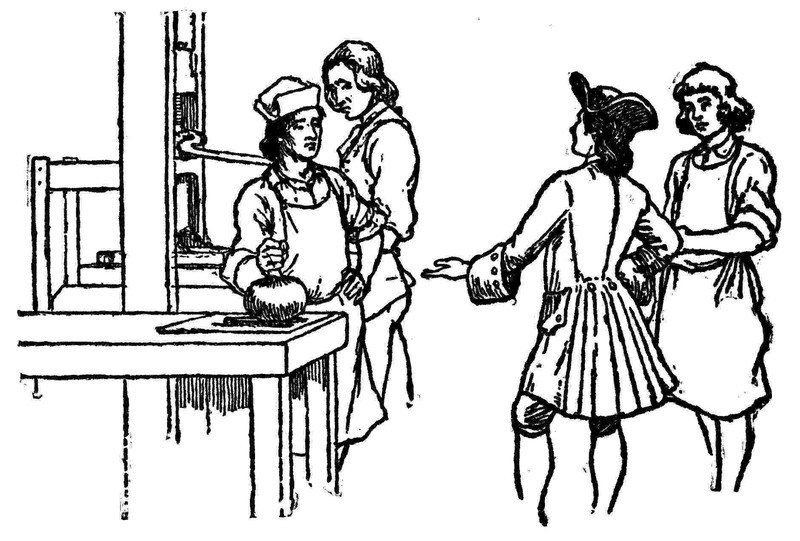
The journeymen were inquisitive where I had been, what sort of a country it was, and how I lik'd it. I prais'd it much, and the happy life I led in it, expressing strongly my intention of returning to it; and, one of them asking what kind of money we had there, I produc'd a handful of silver, and spread it before them, which was a kind of raree-show32 they had not been us'd to, paper being the money of Boston.33 Then I took an opportunity of letting them see my watch; and, lastly (my brother still grum and sullen), I gave them a piece of eight34 to drink, and took my leave. This visit of mine offended him extreamly; for, when my mother some time after spoke to him of a reconciliation, and of her wishes to see us on good terms together, and that we might live for the future as brothers, he said I had insulted him in such a manner before his people that he could never forget or forgive it. In this, however, he was mistaken.
My father received the governor's letter with some apparent surprise, but said little of it to me for some days, when Capt. Holmes returning he show'd it to him, asked him if he knew Keith, and what kind of man he was; adding his opinion that he must be of small discretion to think of setting a boy up in business who wanted yet three years of being at man's estate. Holmes said what he could in favour of the project, but my father was clear in the impropriety of it, and at last, gave a flat denial to it. Then he wrote a civil letter to Sir William, thanking him for the patronage he had so kindly offered me, but declining to assist me as yet in setting up, I being, in his opinion, too young to be trusted with the management of a business so important, and for which the preparation must be so expensive.
My friend and companion Collins, who was a clerk in the post-office, pleas'd with the account I gave him of my new country, determined to go thither also; and, while I waited for my father's determination, he set out before me by land to Rhode Island, leaving his books, which were a pretty collection of mathematicks and natural philosophy, to come with mine and me to New York, where he propos'd to wait for me.
My father, tho' he did not approve Sir William's proposition, was yet pleas'd that I had been able to obtain so advantageous a character from a person of such note where I had resided, and that I had been so industrious and careful as to equip myself so handsomely in so short a time; therefore, seeing no prospect of an accommodation between my brother and me, he gave his consent to my returning again to Philadelphia, advis'd me to behave respectfully to the people there, endeavour to obtain the general esteem, and avoid lampooning and libeling, to which he thought I had too much inclination; telling me, that by steady industry and a prudent parsimony I might save enough by the time I was one-and-twenty to set me up; and that, if I came near the matter, he would help me out with the rest. This was all I could obtain, except some small gifts as tokens of his and my mother's love, when I embark'd again for New York, now with their approbation and their blessing.
The sloop putting in at Newport, Rhode Island, I visited my brother John, who had been married and settled there some years. He received me very affectionately, for he always lov'd me. A friend of his, one Vernon, having some money due to him in Pennsylvania, about thirty-five pounds currency, desired I would receive it for him, and keep it till I had his directions what to remit it in. Accordingly, he gave me an order. This afterwards occasion'd me a good deal of uneasiness.
At Newport we took in a number of passengers for New York, among which were two young women, companions, and a grave, sensible, matronlike Quaker woman, with her attendants. I had shown an obliging readiness to do her some little services, which impress'd her I suppose with a degree of good will toward me; therefore, when she saw a daily growing familiarity between me and the two young women, which they appear'd to encourage, she took me aside, and said, "Young man, I am concern'd for thee, as thou hast no friend with thee, and seems not to know much of the world, or of the snares youth is expos'd to; depend upon it, those are very bad women; I can see it in all their actions; and if thee art not upon thy guard, they will draw thee into some danger; they are strangers to thee, and I advise thee, in a friendly concern for thy welfare, to have no acquaintance with them." As I seem'd at first not to think so ill of them as she did, she mentioned some things she had observ'd and heard that had escap'd my notice, but now convinc'd me she was right. I thank'd her for her kind advice, and promis'd to follow it. When we arriv'd at New York, they told me where they liv'd, and invited me to come and see them; but I avoided it, and it was well I did; for the next day the captain miss'd a silver spoon and some other things, that had been taken out of his cabin, and, knowing that these were a couple of strumpets, he got a warrant to search their lodgings, found the stolen goods, and had the thieves punish'd. So, tho' we had escap'd a sunken rock, which we scrap'd upon in the passage, I thought this escape of rather more importance to me.
At New York I found my friend Collins, who had arriv'd there some time before me. We had been intimate from children, and had read the same books together; but he had the advantage of more time for reading and studying, and a wonderful genius for mathematical learning, in which he far outstript me. While I liv'd in Boston, most of my hours of leisure for conversation were spent with him, and he continu'd a sober as well as an industrious lad; was much respected for his learning by several of the clergy and other gentlemen, and seemed to promise making a good figure in life. But, during my absence, he had acquir'd a habit of sotting with brandy; and I found by his own account, and what I heard from others, that he had been drunk every day since his arrival at New York, and behav'd very oddly. He had gam'd, too, and lost his money, so that I was oblig'd to discharge his lodgings, and defray his expenses to and at Philadelphia, which prov'd extremely inconvenient to me.
The then governor of New York, Burnet (son of Bishop Burnet), hearing from the captain that a young man, one of his passengers, had a great many books, desir'd he would bring me to see him. I waited upon him accordingly, and should have taken Collins with me but that he was not sober. The gov'r. treated me with great civility, show'd me his library, which was a very large one, and we had a good deal of conversation about books and authors. This was the second governor who had done me the honour to take notice of me; which, to a poor boy like me, was very pleasing.
We proceeded to Philadelphia. I received on the way Vernon's money, without which we could hardly have finish'd our journey. Collins wished to be employ'd in some counting-house; but, whether they discover'd his dramming by his breath, or by his behaviour, tho' he had some recommendations, he met with no success in any application, and continu'd lodging and boarding at the same house with me, and at my expense. Knowing I had that money of Vernon's, he was continually borrowing of me, still promising repayment as soon as he should be in business. At length he had got so much of it that I was distress'd to think what I should do in case of being call'd on to remit it.
His drinking continu'd, about which we sometimes quarrel'd; for, when a little intoxicated, he was very fractious. Once, in a boat on the Delaware with some other young men, he refused to row in his turn. "I will be row'd home," says he. "We will not row you," says I. "You must, or stay all night on the water," says he, "just as you please." The others said, "Let us row; what signifies it?" But, my mind being soured with his other conduct, I continu'd to refuse. So he swore he would make me row, or throw me overboard; and coming along, stepping on the thwarts, toward me, when he came up and struck at me, I clapped my hand under his crutch, and, rising, pitched him head-foremost into the river. I knew he was a good swimmer, and so was under little concern about him; but before he could get round to lay hold of the boat, we had with a few strokes pull'd her out of his reach; and ever when he drew near the boat, we ask'd if he would row, striking a few strokes to slide her away from him. He was ready to die with vexation, and obstinately would not promise to row. However, seeing him at last beginning to tire, we lifted him in and brought him home dripping wet in the evening. We hardly exchang'd a civil word afterwards, and a West India captain, who had a commission to procure a tutor for the sons of a gentleman at Barbados, happening to meet with him, agreed to carry him thither. He left me then, promising to remit me the first money he should receive in order to discharge the debt; but I never heard of him after.
The breaking into this money of Vernon's was one of the first great errata of my life; and this affair show'd that my father was not much out in his judgment when he suppos'd me too young to manage business of importance. But Sir William, on reading his letter, said he was too prudent. There was great difference in persons; and discretion did not always accompany years, nor was youth always without it. "And since he will not set you up," says he, "I will do it myself. Give me an inventory of the things necessary to be had from England, and I will send for them. You shall repay me when you are able; I am resolv'd to have a good printer here, and I am sure you must succeed." This was spoken with such an appearance of cordiality, that I had not the least doubt of his meaning what he said. I had hitherto kept the proposition of my setting up, a secret in Philadelphia, and I still kept it. Had it been known that I depended on the governor, probably some friend, that knew him better, would have advis'd me not to rely on him, as I afterwards heard it as his known character to be liberal of promises which he never meant to keep. Yet, unsolicited as he was by me, how could I think his generous offers insincere? I believ'd him one of the best men in the world.
I presented him an inventory of a little print'-house, amounting by my computation to about one hundred pounds sterling. He lik'd it, but ask'd me if my being on the spot in England to chuse the types, and see that everything was good of the kind, might not be of some advantage. "Then," says he, "when there, you may make acquaintances, and establish correspondences in the bookselling and stationery way." I agreed that this might be advantageous. "Then," says he, "get yourself ready to go with Annis;" which was the annual ship, and the only one at that time usually passing between London and Philadelphia. But it would be some months before Annis sail'd, so I continued working with Keimer, fretting about the money Collins had got from me, and in daily apprehensions of being call'd upon by Vernon, which, however, did not happen for some years after.
I believe I have omitted mentioning that, in my first voyage from Boston, being becalm'd off Block Island, our people set about catching cod, and hauled up a great many. Hitherto I had stuck to my resolution of not eating animal food, and on this occasion I consider'd, with my master Tryon, the taking every fish as a kind of unprovoked murder, since none of them had, or ever could do us any injury that might justify the slaughter. All this seemed very reasonable. But I had formerly been a great lover of fish, and, when this came hot out of the frying-pan, it smelt admirably well. I balanc'd some time between principle and inclination, till I recollected that, when the fish were opened, I saw smaller fish taken out of their stomachs; then thought I, "If you eat one another, I don't see why we mayn't eat you." So I din'd upon cod very heartily, and continued to eat with other people, returning only now and then occasionally to a vegetable diet. So convenient a thing is it to be a reasonable creature, since it enables one to find or make a reason for everything one has a mind to do.
V
EARLY FRIENDS IN PHILADELPHIA
KEIMER and I liv'd on a pretty good familiar footing, and agreed tolerably well, for he suspected nothing of my setting up. He retained a great deal of his old enthusiasms and lov'd argumentation. We therefore had many disputations. I used to work him so with my Socratic method, and had trepann'd him so often by questions apparently so distant from any point we had in hand, and yet by degrees led to the point, and brought him into difficulties and contradictions, that at last he grew ridiculously cautious, and would hardly answer me the most common question, without asking first, "What do you intend to infer from that?" However, it gave him so high an opinion of my abilities in the confuting way, that he seriously proposed my being his colleague in a project he had of setting up a new sect. He was to preach the doctrines, and I was to confound all opponents. When he came to explain with me upon the doctrines, I found several conundrums which I objected to, unless I might have my way a little too, and introduce some of mine.
Keimer wore his beard at full length, because somewhere in the Mosaic law it is said, "Thou shalt not mar the corners of thy beard." He likewise kept the Seventh day, Sabbath; and these two points were essentials with him. I dislik'd both; but agreed to admit them upon condition of his adopting the doctrine of using no animal food. "I doubt," said he, "my constitution will not bear that." I assur'd him it would, and that he would be the better for it. He was usually a great glutton, and I promised myself some diversion in half starving him. He agreed to try the practice, if I would keep him company. I did so, and we held it for three months. We had our victuals dress'd, and brought to us regularly by a woman in the neighborhood, who had from me a list of forty dishes, to be prepar'd for us at different times, in all which there was neither fish, flesh, nor fowl, and the whim suited me the better at this time from the cheapness of it, not costing us above eighteenpence sterling each per week. I have since kept several Lents most strictly, leaving the common diet for that, and that for the common, abruptly, without the least inconvenience, so that I think there is little in the advice of making those changes by easy gradations. I went on pleasantly, but poor Keimer suffered grievously, tired of the project, long'd for the flesh-pots of Egypt, and order'd a roast pig. He invited me and two women friends to dine with him; but, it being brought too soon upon table, he could not resist the temptation, and ate the whole before we came.
I had made some courtship during this time to Miss Read. I had a great respect and affection for her, and had some reason to believe she had the same for me; but, as I was about to take a long voyage, and we were both very young, only a little above eighteen, it was thought most prudent by her mother to prevent our going too far at present, as a marriage, if it was to take place, would be more convenient after my return, when I should be, as I expected, set up in my business. Perhaps, too, she thought my expectations not so well founded as I imagined them to be.
My chief acquaintances at this time were Charles Osborne, Joseph Watson, and James Ralph, all lovers of reading. The two first were clerks to an eminent scrivener or conveyancer in the town, Charles Brockden; the other was clerk to a merchant. Watson was a pious, sensible young man, of great integrity; the others rather more lax in their principles of religion, particularly Ralph, who, as well as Collins, had been unsettled by me, for which they both made me suffer. Osborne was sensible, candid, frank; sincere and affectionate to his friends; but, in literary matters, too fond of criticizing. Ralph was ingenious, genteel in his manners, and extremely eloquent; I think I never knew a prettier talker. Both of them were great admirers of poetry, and began to try their hands in little pieces. Many pleasant walks we four had together on Sundays into the woods, near Schuylkill, where we read to one another, and conferr'd on what we read.
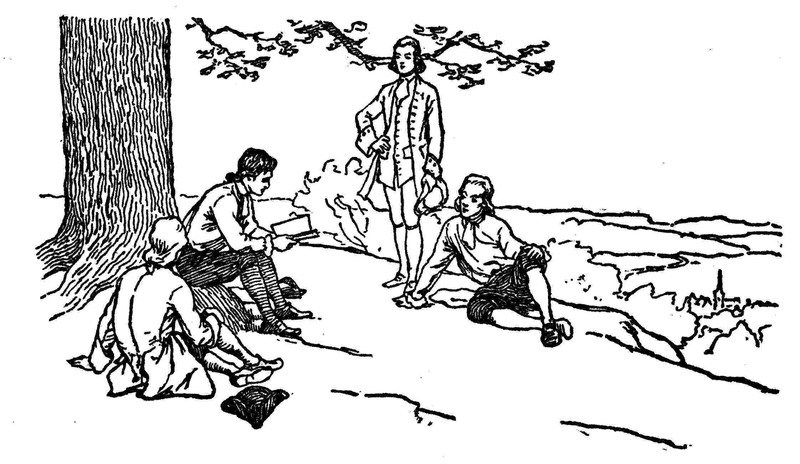
Ralph was inclin'd to pursue the study of poetry, not doubting but he might become eminent in it, and make his fortune by it, alleging that the best poets must, when they first began to write, make as many faults as he did. Osborne dissuaded him, assur'd him he had no genius for poetry, and advis'd him to think of nothing beyond the business he was bred to; that, in the mercantile way, tho' he had no stock, he might, by his diligence and punctuality, recommend himself to employment as a factor, and in time acquire wherewith to trade on his own account. I approv'd the amusing one's self with poetry now and then, so far as to improve one's language, but no farther.
On this it was propos'd that we should each of us, at our next meeting, produce a piece of our own composing, in order to improve by our mutual observations, criticisms, and corrections. As language and expression were what we had in view, we excluded all considerations of invention by agreeing that the task should be a version of the eighteenth Psalm, which describes the descent of a Deity. When the time of our meeting drew nigh, Ralph called on me first, and let me know his piece was ready. I told him I had been busy, and, having little inclination, had done nothing. He then show'd me his piece for my opinion, and I much approv'd it, as it appear'd to me to have great merit. "Now," says he, "Osborne never will allow the least merit in anything of mine, but makes 1000 criticisms out of mere envy. He is not so jealous of you; I wish, therefore, you would take this piece, and produce it as yours; I will pretend not to have had time, and so produce nothing. We shall then see what he will say to it." It was agreed, and I immediately transcrib'd it, that it might appear in my own hand.
We met; Watson's performance was read; there were some beauties in it, but many defects. Osborne's was read; it was much better; Ralph did it justice; remarked some faults, but applauded the beauties. He himself had nothing to produce. I was backward; seemed desirous of being excused; had not had sufficient time to correct, etc.; but no excuse could be admitted; produce I must. It was read and repeated; Watson and Osborne gave up the contest, and join'd in applauding it. Ralph only made some criticisms, and propos'd some amendments; but I defended my text. Osborne was against Ralph, and told him he was no better a critic than poet, so he dropt the argument. As they two went home together, Osborne expressed himself still more strongly in favor of what he thought my production; having restrain'd himself before, as he said, lest I should think it flattery. "But who would have imagin'd," said he, "that Franklin had been capable of such a performance; such painting, such force, such fire! He has even improv'd the original. In his common conversation he seems to have no choice of words; he hesitates and blunders; and yet, good God! how he writes!" When we next met, Ralph discovered the trick we had plaid him, and Osborne was a little laughed at.
This transaction fixed Ralph in his resolution of becoming a poet. I did all I could to dissuade him from it, but he continued scribbling verses till Pope cured him.35 He became, however, a pretty good prose writer. More of him hereafter. But, as I may not have occasion again to mention the other two, I shall just remark here, that Watson died in my arms a few years after, much lamented, being the best of our set. Osborne went to the West Indies, where he became an eminent lawyer and made money, but died young. He and I had made a serious agreement, that the one who happen'd first to die should, if possible, make a friendly visit to the other, and acquaint him how he found things in that separate state. But he never fulfill'd his promise.
VI
FIRST VISIT TO LONDON
THE governor, seeming to like my company, had me frequently to his house, and his setting me up was always mention'd as a fixed thing. I was to take with me letters recommendatory to a number of his friends, besides the letter of credit to furnish me with the necessary money for purchasing the press and types, paper, etc. For these letters I was appointed to call at different times, when they were to be ready; but a future time was still named. Thus he went on till the ship, whose departure too had been several times postponed, was on the point of sailing. Then, when I call'd to take my leave and receive the letters, his secretary, Dr. Bard, came out to me and said the governor was extremely busy in writing, but would be down at Newcastle, before the ship, and there the letters would be delivered to me.
Ralph, though married, and having one child, had determined to accompany me in this voyage. It was thought he intended to establish a correspondence, and obtain goods to sell on commission; but I found afterwards, that, thro' some discontent with his wife's relations, he purposed to leave her on their hands, and never return again. Having taken leave of my friends, and interchang'd some promises with Miss Read, I left Philadelphia in the ship, which anchor'd at Newcastle. The governor was there; but when I went to his lodging, the secretary came to me from him with the civillest message in the world, that he could not then see me, being engaged in business of the utmost importance, but should send the letters to me on board, wished me heartily a good voyage and a speedy return, etc. I returned on board a little puzzled, but still not doubting.
Mr. Andrew Hamilton, a famous lawyer of Philadelphia, had taken passage in the same ship for himself and son, and with Mr. Denham, a Quaker merchant, and Messrs. Onion and Russel, masters of an iron work in Maryland, had engaged the great cabin; so that Ralph and I were forced to take up with a berth in the steerage, and none on board knowing us, were considered as ordinary persons. But Mr. Hamilton and his son (it was James, since governor) return'd from Newcastle to Philadelphia, the father being recall'd by a great fee to plead for a seized ship; and, just before we sail'd, Colonel French coming on board, and showing me great respect, I was more taken notice of, and, with my friend Ralph, invited by the other gentlemen to come into the cabin, there being now room. Accordingly, we remov'd thither.
Understanding that Colonel French had brought on board the governor's despatches, I ask'd the captain for those letters that were to be under my care. He said all were put into the bag together and he could not then come at them; but, before we landed in England, I should have an opportunity of picking them out; so I was satisfied for the present, and we proceeded on our voyage. We had a sociable company in the cabin, and lived uncommonly well, having the addition of all Mr. Hamilton's stores, who had laid in plentifully. In this passage Mr. Denham contracted a friendship for me that continued during his life. The voyage was otherwise not a pleasant one, as we had a great deal of bad weather.



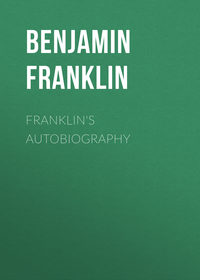
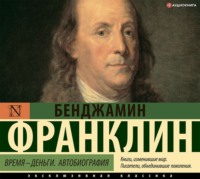

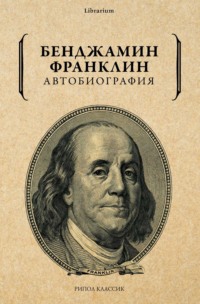
![Memoirs of Benjamin Franklin; Written by Himself. [Vol. 2 of 2]](/covers_200/24858395.jpg)
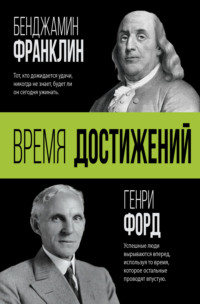
![Memoirs of Benjamin Franklin; Written by Himself. [Vol. 1 of 2]](/covers_200/24858139.jpg)